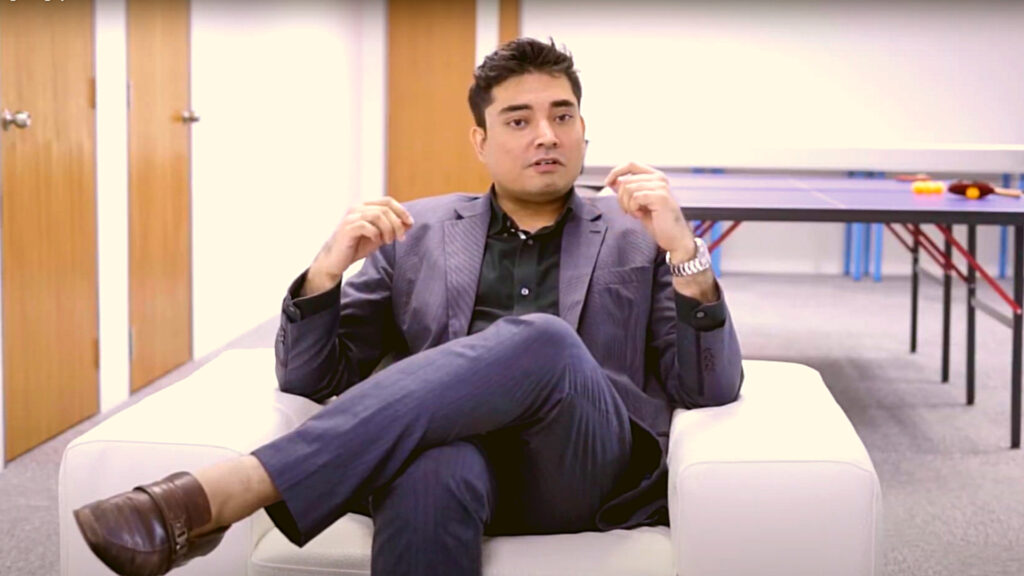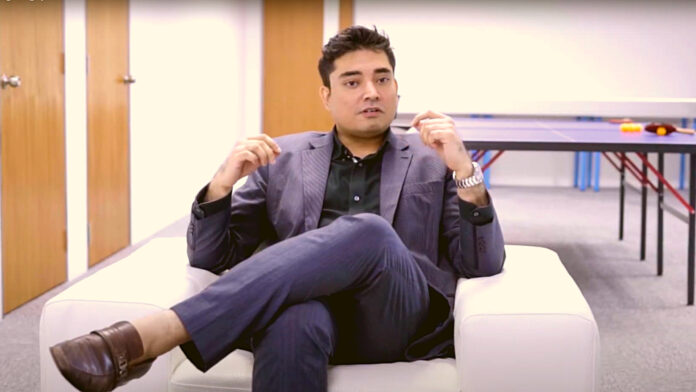Sancy Suraj is a name that is synonymous with memory feats and training. As the CEO of Knowles Training Institute, The Umonics Method, and Pinnacle Minds, Sancy has trained over 10,000 people worldwide in the art of memorization. With 1 Guinness World Record and 6 Singapore Book of Records to his name, Sancy’s memory feats have captured the imagination of people worldwide. In this article, we will delve into Sancy Suraj’s life, his impressive memory feats, and the techniques he uses to memorize large amounts of information quickly and accurately.

Can you describe some of your most impressive memory feats and what they involved?
One of my most impressive memory feats is undoubtedly the Guinness World Record I set for the longest color sequence memorized, which consisted of 160 colors in order. To accomplish this feat, I used the same memory techniques that I teach my students, such as visual association, linking, and location, to create a vivid mental image for each color and then connect them all together in a sequence. Another memorable achievement was memorizing the order of an entire deck of shuffled playing cards in just 18.65 seconds. This was a particularly challenging feat because it required not only memorizing each card’s value and suit but also the specific order in which they were shuffled.
When attempting to memorize something particularly challenging, such as a long string of numbers or a complicated sequence of information, I try to break it down into smaller, more manageable chunks. I then create a mental image for each chunk, using techniques like association, visualization, and repetition to reinforce the memory. I also try to focus on the meaning behind the information, rather than just the raw data, as this can help me to connect it to other knowledge and make it more memorable.
Before a performance or competition, I do have a few pre-performance rituals that help me to stay focused and calm. I always make sure to get a good night’s sleep beforehand and eat a healthy breakfast to fuel my brain. I also like to take some time to meditate or do some deep breathing exercises to calm my nerves and clear my mind. Finally, I always try to stay positive and visualize myself succeeding in my memory feats, as I believe that a positive attitude and mindset are crucial for success in any field.
What goes through your mind when you’re attempting to memorize something particularly challenging?
Over the years, my memory training has evolved as I’ve discovered new techniques and approaches to memory. One of the biggest breakthroughs I’ve had was in developing my own mnemonic system called the “Umonics Method,” which is designed to help people memorize anything from foreign language vocabulary to speeches to entire books. This system is based on the principles of association, visualization, and repetition, and it has been incredibly effective in helping my students to improve their memory skills.
Another breakthrough I’ve had is in understanding the power of location and spatial memory. By associating pieces of information with specific locations in a familiar environment, such as a childhood home or a favorite park, it’s possible to create a mental map that makes it easier to recall the information later on. I’ve used this technique in my own memory feats, such as memorizing the order of shuffled playing cards, and it’s been incredibly helpful in improving my speed and accuracy.
In terms of training to memorize large amounts of information quickly and accurately, I recommend a combination of regular practice, focused attention, and mental preparation. This means setting aside dedicated time each day to work on memorization skills, choosing information that is relevant and interesting to you, and using techniques like visualization and association to make the information more memorable. It also means maintaining a healthy lifestyle, with plenty of sleep, exercise, and good nutrition, to ensure that your brain is functioning at its best. By consistently practicing these techniques and habits, it’s possible to improve your memory skills and achieve impressive feats of memorization.
Do you have any pre-performance rituals or habits that help you stay focused and calm?
As a memory athlete and trainer, I have certainly experienced my fair share of memory failures or lapses during competitions or performances. In those moments, it can be easy to become overwhelmed and lose confidence in your abilities. However, I’ve learned that the key is to remain calm and focused and to trust in the techniques that I’ve practiced and honed over time.
One strategy that has been helpful for me in handling memory failures is to take a step back and reassess my approach. Often, when I’m struggling to recall a piece of information, it’s because I haven’t formed a strong enough mental image or association for it. By taking a moment to re-imagine the information in a more vivid or memorable way, I can often recover the memory and move on with the task at hand.
Another important skill is the ability to manage stress and anxiety, which can be major obstacles to memory performance. I’ve found that techniques like meditation, deep breathing, and visualization can be incredibly helpful in calming my nerves and improving my focus. Additionally, reminding myself of past successes and focusing on the positive aspects of my performance can help to boost my confidence and keep me motivated.
Overall, experiencing memory failures or lapses is a normal and expected part of the memory training process. The key is to stay calm, stay focused, and trust in the techniques and strategies that have helped you to succeed in the past. With practice and perseverance, anyone can improve their memory skills and achieve impressive feats of memorization.
“Memory failures are opportunities for growth. By staying calm, reassessing our approach, and managing stress and anxiety, we can turn these setbacks into stepping stones on the path to improved memory performance.”
How has your memory training evolved over the years, and what have been some of the biggest breakthroughs you’ve had?
Throughout my career as a memory athlete and trainer, I have taken on many unusual memory challenges that have pushed the boundaries of what is possible with the human mind. One of my most memorable feats was memorizing the order of 52 shuffled playing cards in just 14.84 seconds, which earned me a Guinness World Record. Another memorable challenge was memorizing a sequence of 160 random digits in just five minutes.
However, I’ve also taken on more unconventional memory challenges, such as memorizing the first 10,000 decimal places of pi, the entire periodic table of elements, and even the entire Oxford English Dictionary. These challenges are not just about pushing the limits of what I’m capable of, but also about showing others what is possible and inspiring them to pursue their own memory goals.
I’ve also taken on challenges that are more specific to my interests and background, such as memorizing the lyrics to every song on my favorite album or memorizing the names and faces of every student in my memory training classes. These challenges are about personal growth and self-improvement, and they help me to continue to refine and develop my memory skills over time.
Ultimately, taking on these unusual memory challenges is about exploring the full potential of the human mind and inspiring others to do the same. By pushing ourselves to memorize more and more complex information, we can unlock new levels of creativity, problem-solving, and intellectual achievement.
How do you train yourself to memorize large amounts of information quickly and accurately?
As a memory athlete and trainer, one of the most important aspects of my training is developing the ability to memorize large amounts of information quickly and accurately. To do this, I rely on a variety of techniques and strategies that have been proven to be effective over time.
One of the most powerful techniques for memorizing large amounts of information is called the Memory Palace, also known as the Method of Loci. This technique involves mentally placing pieces of information in specific locations along a familiar route or image, such as the rooms of a house or a landscape. By associating each piece of information with a specific location, we can create a vivid mental map that allows us to easily recall the information later.
Another effective technique is called the Major System, which involves converting numbers into consonant sounds and then creating words or phrases based on those sounds. This can be useful for memorizing long strings of numbers or other numerical information, as it allows us to create mental images and associations that are easier to recall.
I also use visualization techniques to help me memorize information, such as creating mental images that are vivid and unusual or using humor or wordplay to create memorable associations. For example, to remember the names of people I meet, I might visualize them doing something that relates to their name or creating a memorable story around their name.
Overall, the key to memorizing large amounts of information quickly and accurately is to practice these techniques consistently and to find the ones that work best for you. By training our brains to become more efficient at encoding and retrieving information, we can unlock incredible memory abilities that can benefit us in all areas of life.
“As memory athletes and trainers, we rely on a variety of proven techniques and strategies to memorize large amounts of information quickly and accurately. From the Memory Palace and Major System to visualization and wordplay, the key is to consistently practice and find what works best for us. By unlocking our memory abilities, we can achieve impressive feats of memorization that can benefit us in all areas of life.”
When asked to describe some of his most impressive memory feats, Sancy Suraj revealed that his most remarkable achievements involved memorizing large amounts of information in a short period. For instance, in 2018, he memorized the complete sequence of a shuffled deck of 52 playing cards in just 17.02 seconds. When asked what goes through his mind when attempting to memorize something particularly challenging, Sancy explained that he creates mental images and associations to remember the information.
Despite his remarkable memory abilities, Sancy Suraj is just like any other performer, and he has his own pre-performance rituals or habits that help him stay focused and calm. Sancy’s pre-performance rituals involve meditation, visualization, and breathing exercises, which help him stay focused and calm.
Sancy Suraj’s memory training has evolved over the years, and he has had several breakthroughs that have enabled him to achieve his impressive feats. According to Sancy, one of the biggest breakthroughs was discovering the “Method of Loci” or the “Memory Palace,” a technique that involves creating a mental image of a familiar place and associating each piece of information with a specific location in that space.

Have you ever experienced memory failures or lapses during a competition or performance, and how did you handle it?
As a memory athlete and trainer, I have experienced my fair share of memory failures and lapses during competitions and performances. It’s a natural part of the learning process and something that every memory athlete must learn to overcome.
When I experience a memory lapse, I try not to panic or become overwhelmed. Instead, I take a deep breath and try to focus on the information that I do remember. Often, by focusing on a single piece of information or visualizing a specific image, I can trigger my memory and recall the rest of the information.
Another important strategy is to practice under stress and pressure so that I’m better prepared for the real thing. This can involve simulating competition conditions during training, such as using a timer, working in a noisy environment, or practicing in front of an audience.
Finally, I always try to approach memory competitions and performances with a positive and growth-oriented mindset. Even if I don’t perform as well as I had hoped, I try to learn from my mistakes and use them as an opportunity to improve my skills and techniques.
Ultimately, experiencing memory lapses is a natural part of the memory training process, and learning how to overcome them is key to achieving success as a memory athlete or improving one’s memory skills in general.
What are some of the most unusual things you’ve ever memorized, and why did you choose to take on those challenges?
As a memory athlete and trainer, I have taken on many unusual memorization challenges over the years, each with its own unique set of difficulties and rewards. One of the most memorable challenges I undertook was memorizing the entire periodic table of elements.
This was a particularly challenging task because the periodic table consists of 118 elements, each with its own unique atomic number, symbol, and properties. To memorize it, I used a combination of the Memory Palace technique and the Major System, creating mental images and associations to help me remember each element.
Another unusual challenge I took on was memorizing the order of a shuffled deck of cards in the shortest possible time. This challenge required me to use a variety of memory techniques, such as the Memory Palace and visualization, to create a mental image of each card and its position in the deck.
I have also memorized long strings of numbers, such as pi to 10,000 digits, and even memorized entire books. Each challenge has its own unique set of difficulties and requires me to adapt my memorization techniques to the specific task at hand.
Overall, I take on these unusual memorization challenges as a way to push the limits of my memory skills and to inspire others to develop their own memory abilities. By undertaking these challenges, I hope to show that with the right techniques and mindset, anyone can improve their memory and achieve incredible feats of memorization.
How do you use your memory skills in your daily life, outside of competitions and performances?
My memory skills are not just limited to competitions and performances. I use them in my daily life as well, and they have helped me in many different areas.
For example, I find that my memory skills make it easier to learn new information quickly and retain it over time. This is particularly helpful in my work as a CEO and memory trainer, as I need to stay up-to-date with the latest research and training techniques.
I also use my memory skills to remember important dates, events, and appointments. By using techniques such as visualization and association, I can easily recall these details without the need for written notes or reminders.
In addition, my memory skills have helped me in my personal life as well. For example, I can easily remember the names of new people I meet, which helps to build stronger connections and relationships.
Overall, my memory skills have become an integral part of my daily life, helping me to be more efficient, productive, and successful in both my personal and professional pursuits.
Do you have any advice for someone who wants to attempt a memory feat like yours, or who wants to improve their memory skills in general?
For anyone looking to improve their memory skills, my first piece of advice would be to start with the basics. This means focusing on building a strong foundation of memory techniques that can be applied to a wide range of tasks and information.
One of the most effective techniques for improving memory is the Memory Palace or Method of Loci. This involves creating a mental image of a familiar place, such as your home or workplace, and then associating each piece of information you want to remember with a specific location in that space.
Another useful technique is visualization, which involves creating a vivid mental image of the information you want to remember. This can be particularly helpful for remembering names, faces, and other details.
I also recommend developing a regular practice routine for memory training. This could involve setting aside time each day to practice memorizing lists, numbers, or other types of information using the techniques you have learned.
Finally, it’s important to stay motivated and engaged in the process of improving your memory. Setting goals and challenging yourself to take on new memorization challenges can be a great way to stay inspired and continue making progress.
Overall, improving your memory skills takes practice, patience, and a willingness to learn and experiment with different techniques. With dedication and effort, anyone can develop their memory abilities and achieve incredible feats of memorization.
What are your future plans and goals when it comes to your memory training and performances?
My future plans and goals when it comes to my memory training and performances are to continue pushing the boundaries of what is possible and to share my knowledge and skills with others.
In terms of my own training and performance, I plan to continue developing new techniques and approaches to memorization and to seek out new challenges and opportunities to test and expand my skills.
At the same time, I am also committed to sharing my knowledge and skills with others through my training programs and courses. I believe that anyone can develop their memory abilities with the right training and guidance, and I am passionate about helping others unlock their full potential.
In the coming years, I hope to reach even more people with my training and inspire a new generation of memory athletes and enthusiasts. I also plan to continue promoting the importance of memory training and its potential benefits for all aspects of life, from education and career success to personal growth and well-being.
Overall, my goal is to continue making a positive impact on the world through my memory training and performances and to help as many people as possible achieve their own memory-related goals and aspirations.
“My future plans and goals for memory training and performances are to continuously innovate and challenge myself while sharing my knowledge and skills with others, inspiring a new generation of memory enthusiasts and making a positive impact on the world.”
In conclusion, Sancy Suraj is a remarkable individual whose memory feats have inspired and captivated people worldwide. With his dedication, hard work, and innovative approach to memory training, he has set an example for all those who aspire to improve their memory skills. As Sancy continues to push the boundaries of what is possible in memorization, we look forward to seeing what remarkable feats he will achieve next.

























